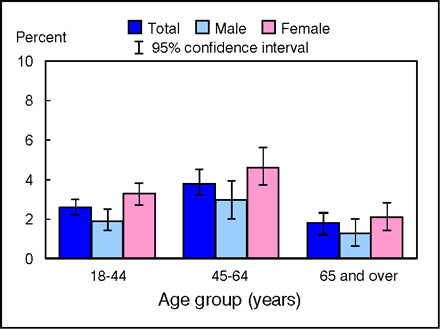|
Figure 13.2.
Percent of adults aged 18 years and over who experienced serious psychological
distress during the past 30 days, by age group and sex: United States,
January - June 2002

NOTES: Six
psychological distress questions are included in
the Sample Adult Core component. These questions ask
how often a respondent experienced symptoms of psychological distress
during the past 30 days. The
response codes (0-4) of the six items for each person are summed to yield a
scale with a 0-24 range. A
value of 13 or more for this scale is used here to define serious psychological distress (1).
DATA SOURCE: Based on
data collected from January through June in the Sample Adult Core component
of the 2002 National Health Interview Survey.
|